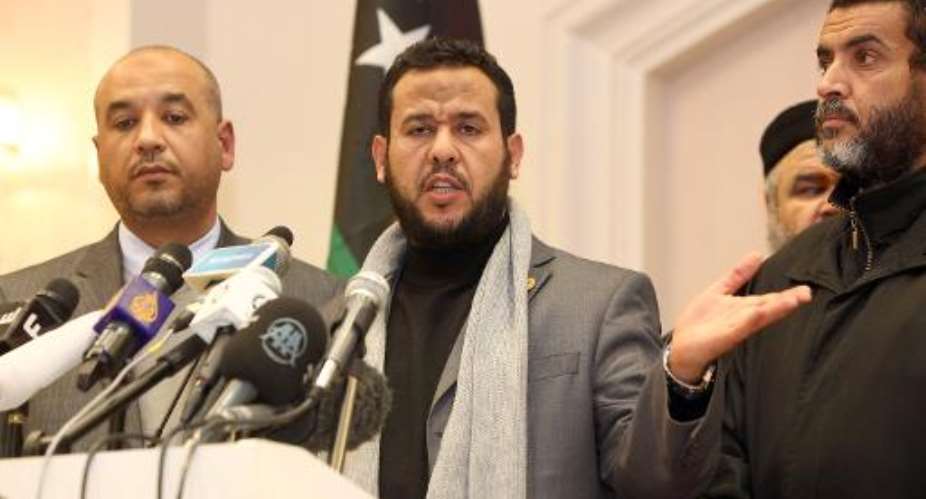London (AFP) - A British court on Thursday ruled that a Libyan politician can sue the government over his claim that Britain conspired with the CIA in his "rendition" to Libya for torture in a case that could pave the way for similar legal action.
The Court of Appeal ruling overturns a previous court decision in December that said that while Abdul-Hakim Belhaj and his wife had a "well-founded claim" the case was beyond the jurisdiction of British courts.
But Thursday's judgement said that "unless the English courts are able to exercise jurisdiction in this case, these very grave allegations against the executive will never be subjected to judicial investigation".
"There is a compelling public interest in the investigation by the English courts of these very grave allegations," it said.
The government can still appeal the case, meaning that a final ruling on whether Belhaj and his wife can pursue their legal action is not expected until 2015.
"It's a very significant step forward to see these cases finally being heard in the British courts," Sapna Malik of the law firm Leigh Day, which has been representing Belhaj, told the BBC outside the court.
Belhaj, who became Tripoli's military commander after Libyan dictator Moamer Kadhafi was ousted in the 2011 revolution, claims British involvement in his illegal rendition.
He and his wife said they were detained by US intelligence officers at Bangkok airport in Thailand in 2004 when Belhaj was leader of the anti-Kadhafi Libyan Islamic Fighting Group.
His wife was several months pregnant at the time.
The couple were then taken to Tripoli, where Belhaj was jailed for six years. Files unearthed from Kadhafi's archives after his fall suggest he was captured due to a British tip-off after he initially made an attempt to seek asylum in Britain.
The legal action he launched was against the British government, including the MI5 and MI6 intelligence agencies.
The government argued that evidence should not be heard because the claims involved other countries.
The legal charity Reprieve, which supports Belhaj, said the government was concerned about rendition cases coming to court because they could damage relations with the United States.
Reprieve said in a statement that delivering Belhaj to Libya was "a long-secret part of (former British prime minister) Tony Blair's 2004 'deal in the desert'" that helped restore international relations with Kadhafi.





 Former Kotoko Player George Asare elected SRC President at PUG Law Faculty
Former Kotoko Player George Asare elected SRC President at PUG Law Faculty
 2024 elections: Consider ‘dumsor’ when casting your votes; NPP deserves less — P...
2024 elections: Consider ‘dumsor’ when casting your votes; NPP deserves less — P...
 You have no grounds to call Mahama incompetent; you’ve failed — Prof. Marfo blas...
You have no grounds to call Mahama incompetent; you’ve failed — Prof. Marfo blas...
 2024 elections: NPP creates better policies for people like us; we’ll vote for B...
2024 elections: NPP creates better policies for people like us; we’ll vote for B...
 Don’t exchange your life for wealth; a sparkle of fire can be your end — Gender ...
Don’t exchange your life for wealth; a sparkle of fire can be your end — Gender ...
 Ghana’s newly installed Poland train reportedly involved in accident while on a ...
Ghana’s newly installed Poland train reportedly involved in accident while on a ...
 Chieftaincy disputes: Government imposes 4pm to 7am curfew on Sampa township
Chieftaincy disputes: Government imposes 4pm to 7am curfew on Sampa township
 Franklin Cudjoe fumes at unaccountable wasteful executive living large at the ex...
Franklin Cudjoe fumes at unaccountable wasteful executive living large at the ex...
 I'll 'stoop too low' for votes; I'm never moved by your propaganda — Oquaye Jnr ...
I'll 'stoop too low' for votes; I'm never moved by your propaganda — Oquaye Jnr ...
 Kumasi Thermal Plant commissioning: I pray God opens the eyes of leaders who don...
Kumasi Thermal Plant commissioning: I pray God opens the eyes of leaders who don...
